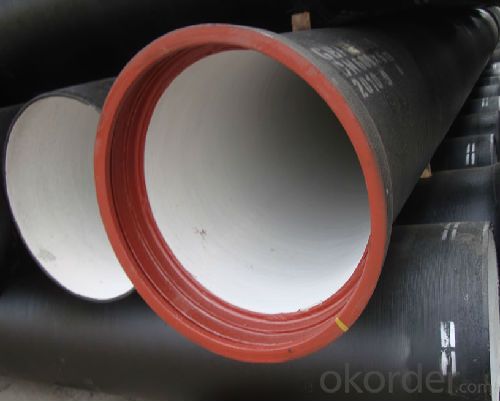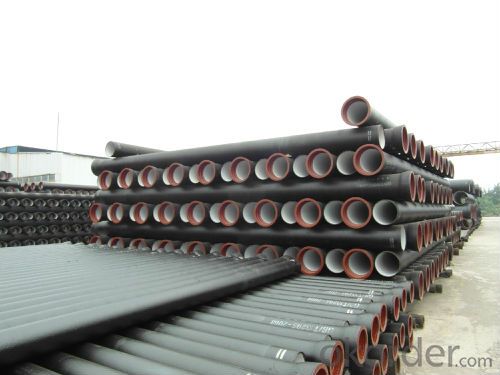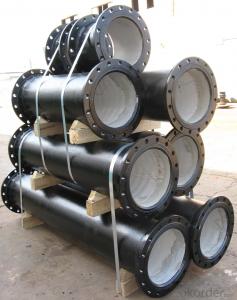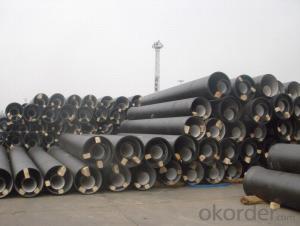Ductile Iron Pipe ISO2531EN545/EN598 C CLASS DN1400
- Loading Port:
- China main port
- Payment Terms:
- TT or LC
- Min Order Qty:
- 20 m.t.
- Supply Capability:
- 200000 m.t./month
OKorder Service Pledge
OKorder Financial Service
You Might Also Like
1.Ductile Iron Pipe Description :
1) Pipes confirm to ISO2531,K9 class,T type joint,6m long,with inside cements lining conform to ISO4179, outside Zinc
spraying(130g/m2) and bitumen coating(70μm) conform to ISO8179.
2) Pipe ends: Spigot and socket ends, with 100% SBR rubber gaskets accoding to ISO4633
3) we can do third party inspection according to customer's request.
2.Main Features of the Ductile Iron Pipe:
1).Quality guarantee
• Chemical checking
• NDE after rough machining
• Mechanical testing after heat treatment
• Final NDE,dimension inspected
2).Packing and Shipping
• standard export package(carton/wooden case/pallet)
• accept FOB,FAS,CNF,CIF door to door etc or customer designated shipping agent
3.Ductile Iron Pipe Images:


4.Ductile Iron Pipe Specification:
Surface Finishes: Bare, Oiled, Mill Varnish, Galv,FBE, FBE Dual, 3LPE, 3LPP, Coal Tar,Concrete Coating and Tape Wrap
End Finishes: Beveled, Square Cut, Threaded, hat
Additional Services: Internal Coating
Packaging: packed in bag, plastic bag, steel strip, steel wire,double wire, iron box, wooden box, tarpaulin, plastic
sheeting
Inspection: MOODY SGS BV GL DNV ABS LIOYD’S
Test: X-ray, UT, magnetic particle,inspection,hydrostatic test.
Processing service: Beveling, Threading, Slotting, Cut-to length, Bends, Quench and Temper, Fabrication, Double-jointing
and On-site assistance
5.FAQ:
We have organized several common questions for our clients,may help you sincerely:
1.Q: Why would you choose ductile iron pipe rather than other pipe materials?
A:The reasons are obvious for that not only ductile iron pipe possesses the inherent strength and flexibility of ductile
iron, combined with proven corrosion protection systems, but also the cost savings can be achieved from design to
installation and commissioning.
2.Q:Why can you guarantee the inner of pipes can’t be corroded?
A: High alumina cement mortar lining and sulphate-resistant cement mortar lining. These two special linings are applicable
to inner anti-corrosion for sewage pipes, improving resistance to erosion of the sewage components.
- Q:What is ductile iron?
- Ductile iron, after being treated with either magnesium or cerium, undergoes an improvement in its mechanical properties. This particular type of cast iron earns the name "ductile" due to its higher degree of ductility in comparison to other cast iron varieties. Ductility pertains to a material's capacity to stretch or deform without breaking. This quality renders ductile iron particularly ideal for applications that demand both high strength and resistance to wear and tear, such as pipes, automotive components, and machinery parts. The inclusion of magnesium or cerium during the manufacturing process aids in the formation of graphite within the iron's structure, contributing to its distinctive properties. This graphite formation serves to enhance the iron's flexibility and reduce its brittleness, enabling it to absorb shock and vibrations without fracturing. As a whole, ductile iron presents a fine balance between the strength of cast iron and the flexibility of steel, thereby establishing itself as a versatile material well-suited for diverse industrial applications.
- Q:What is the expected external coating for ductile iron pipes?
- The expected external coating for ductile iron pipes is typically a protective layer that is applied to the exterior surface of the pipe to prevent corrosion and extend its lifespan. Some common types of external coatings for ductile iron pipes include polyethylene, polyurethane, and epoxy coatings. These coatings provide a barrier between the pipe and the surrounding environment, preventing the pipe from coming into contact with corrosive substances such as soil, water, and chemicals. The choice of coating depends on factors such as the intended application, soil conditions, and the level of corrosion protection required. Overall, the expected external coating for ductile iron pipes is designed to ensure the longevity and durability of the pipes in various environmental conditions.
- Q:How do ductile iron pipes handle thermal cycling in industrial applications?
- Ductile iron pipes are known for their exceptional ability to handle thermal cycling in industrial applications. Thermal cycling refers to the fluctuation in temperature that occurs during the operation of various industrial processes. These pipes are designed to withstand the stresses caused by thermal expansion and contraction, making them highly suitable for environments with significant temperature variations. One of the key characteristics of ductile iron pipes is their high thermal conductivity. This means that they can efficiently conduct heat away from the hot areas, minimizing the impact of thermal cycling. Additionally, ductile iron pipes have a low coefficient of thermal expansion, which means that they expand and contract at a slower rate compared to other materials. This helps to reduce the stresses imposed on the pipes during thermal cycling. Furthermore, ductile iron pipes have excellent mechanical properties, including high tensile strength and impact resistance. These properties enable the pipes to withstand the mechanical stresses that may arise due to thermal cycling. They can resist the formation of cracks or fractures, ensuring the integrity and longevity of the pipes in industrial applications. Moreover, ductile iron pipes have a high resistance to corrosion and oxidation. This is particularly important in industrial settings where the pipes may be exposed to aggressive chemicals or harsh environments. The corrosion resistance of ductile iron pipes ensures that they can withstand the corrosive effects of the process fluids and gases, even during thermal cycling. In summary, ductile iron pipes are well-equipped to handle thermal cycling in industrial applications. Their high thermal conductivity, low coefficient of thermal expansion, excellent mechanical properties, and resistance to corrosion make them a reliable choice for environments with significant temperature variations. These pipes can effectively withstand the stresses caused by thermal cycling, ensuring their durability and longevity in industrial settings.
- Q:Classification of cast iron pipes
- Water cast iron pipe:The use of cast iron cast iron water pipe of No. 18 above by adding nodulizer, after centrifugal ductile cast iron pipe by centrifugal casting machine, the performance of ductile iron pipe with nature, iron and steel, excellent corrosion resistance, good ductility, good sealing effect, simple installation, mainly for municipal, industrial and mining enterprises water, gas, oil etc.. Water supply pipe is the first choice, with high cost performance.
- Q:Are ductile iron pipes resistant to external loads?
- Yes, ductile iron pipes are generally resistant to external loads. Ductile iron is a type of cast iron that has been treated with additives such as magnesium and cerium to make it more flexible and durable. This increased flexibility allows the pipes to withstand high levels of external pressure and stress without cracking or breaking. Ductile iron pipes are commonly used in applications where they are exposed to heavy loads, such as underground water distribution systems, sewer lines, and industrial pipelines. These pipes have been proven to have excellent resistance to external loads, making them a reliable choice for various infrastructure projects.
- Q:How does ductile iron pipe handle thermal expansion and contraction?
- The effectiveness of ductile iron pipe in dealing with thermal expansion and contraction is well-known. This is primarily due to its unique material properties and design characteristics. To begin with, it is worth noting that ductile iron pipe has a high coefficient of linear expansion. This means that it experiences relatively more expansion and contraction compared to other materials when exposed to temperature changes. As a result, the pipe is able to accommodate thermal expansion and contraction without causing excessive stress or deformation. Furthermore, the design of ductile iron pipes includes flexible joints. These joints, such as push-on or mechanical joints, are capable of absorbing the movement caused by thermal expansion and contraction. By providing a certain level of flexibility, these joints enable the pipe to expand and contract within a specific range without compromising its structural integrity. Additionally, the material composition of ductile iron itself plays a significant role in its ability to handle thermal expansion and contraction. Ductile iron is a type of cast iron alloy that contains nodular graphite in its microstructure. This composition provides the pipe with enhanced ductility and tensile strength. As a result, the pipe is able to withstand the stresses induced by thermal expansion and contraction without fracturing or breaking. Overall, ductile iron pipe is designed and produced in a manner that allows it to effectively deal with thermal expansion and contraction. Its high coefficient of linear expansion, flexible joints, and ductile material properties all work together to ensure that the pipe can accommodate temperature changes without causing any significant issues or structural failures.
- Q:What pipe can be used to replace the cast iron pipe in the water supply? Thank you
- You are mistaken in concept. The cast iron pipe is the sort of connection method. The ductile iron pipe is classified according to the material.
- Q:Are ductile iron pipes resistant to UV radiation?
- No, ductile iron pipes are not resistant to UV radiation.
- Q:Are ductile iron pipes suitable for hydroelectric power plants?
- Yes, ductile iron pipes are suitable for hydroelectric power plants. Ductile iron pipes are known for their strength, durability, and flexibility, making them an ideal choice for various applications in the water industry, including hydroelectric power plants. These pipes can withstand high pressure and are resistant to corrosion, making them suitable for transporting water at different stages of the hydroelectric power generation process. Additionally, ductile iron pipes have a long service life and require minimal maintenance, reducing the overall operating costs of the power plant. Hence, ductile iron pipes are a reliable and suitable option for hydroelectric power plants.
- Q:Are ductile iron pipes suitable for oil and gas pipeline applications?
- Yes, ductile iron pipes are suitable for oil and gas pipeline applications. Ductile iron is a strong and durable material that can withstand high pressure and temperature conditions commonly found in oil and gas pipelines. It has excellent corrosion resistance, making it suitable for transporting oil and gas over long distances. Additionally, ductile iron pipes have a smooth interior surface that minimizes friction and allows for efficient flow of oil and gas.
1. Manufacturer Overview |
|
|---|---|
| Location | |
| Year Established | |
| Annual Output Value | |
| Main Markets | |
| Company Certifications | |
2. Manufacturer Certificates |
|
|---|---|
| a) Certification Name | |
| Range | |
| Reference | |
| Validity Period | |
3. Manufacturer Capability |
|
|---|---|
| a)Trade Capacity | |
| Nearest Port | |
| Export Percentage | |
| No.of Employees in Trade Department | |
| Language Spoken: | |
| b)Factory Information | |
| Factory Size: | |
| No. of Production Lines | |
| Contract Manufacturing | |
| Product Price Range | |
Send your message to us
Ductile Iron Pipe ISO2531EN545/EN598 C CLASS DN1400
- Loading Port:
- China main port
- Payment Terms:
- TT or LC
- Min Order Qty:
- 20 m.t.
- Supply Capability:
- 200000 m.t./month
OKorder Service Pledge
OKorder Financial Service
Similar products
New products
Hot products
Related keywords



























